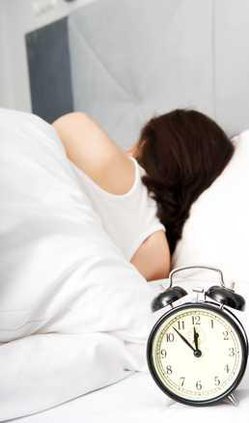You lie in bed in the morning, dreading your first step out of your warm, comfortable bed. Your eyelids feel heavy and youre too tired to move.
Getting out of bed can be a challenge, but for some people, this task is impossible. This nightmare is a reality for 23-year-old Delanie Weyer.
Weyer sleeps most of her day away. When shes awake, she feels confused, delirious and hardly has enough energy to leave her bed.
People thought she was lazy or on drugs
She started noticing something was wrong when she was 18. She slept through a school trip and was lethargic when awake. The chaperones thought Weyer was on drugs, but this was actually the start of her incurable disorder.
Even her mother was suspicious of drug use. Jean Weyer called herself a typical mom that would force her daughter to get out of bed. [W]as she lying to me, was she being lazy, was she taking some kind of drug, mother Jean Weyer questioned.
It took five years before a doctor was able to correctly diagnose Weyer. After visiting various doctors and specialists, Delanie Weyer was diagnosed with Kleine-Levin Syndrome (KLS) in November 2016.
KLS comes and goes without warning
KLS is a rare neurological disorder that causes recurring periods of excessive sleep, changed behavior and a reduced understanding of the world.
Some people call this sleeping beauty syndrome," but the effects of KLS are no fairy tale.
It comes in episodes, which last days, weeks or even months. During this time, the individual cant do anything but sleep. They are completely dependent on caregivers.
People with this disorder act and feel normal in between episodes. In fact, they can go months or years without experiencing symptoms again. But symptoms can return with little to no warning.
Even when shes awake, Delanie doesnt know whats going on
Weyer sleeps between 15 and 20 hours a day, only getting up to eat or use the restroom.
When I am awake Im very delirious, Weyer said. Just very spacey and out of touch with reality, in a sense.
Her deliriousness is to the point that she sometimes doesnt remember things that happen while shes awake.
I have pictures of me doing certain things with family and friends during an episode and I dont remember, she said. Its very scary the things that I have done while in episode ... when I look back, [I see] how dangerous it could have been.
KLS has affected everything in her life, including school, jobs and relationships. Shes even missed holidays and her 21st birthday.
Know the difference between tiredness and KLS
Tiredness can be fixed with a quick nap, but KLS is prolonged excessive tiredness. If you or your child experiences several of these symptoms, call your doctor to see if KLS might be the cause:
Weyers disorder is only one of 500 documented KLS cases. No one knows what causes it, but Weyer hopes she can use her story to educate people about KLS. I can educate them, this is what I have. My episodes are not a choice, she said.
Between her episodes, Weyer enjoys life by doing the things she loves, including being outdoors and spending time with her family.
To find out more about KLS and its symptoms, visit the KLS Foundation.
Getting out of bed can be a challenge, but for some people, this task is impossible. This nightmare is a reality for 23-year-old Delanie Weyer.
Weyer sleeps most of her day away. When shes awake, she feels confused, delirious and hardly has enough energy to leave her bed.
People thought she was lazy or on drugs
She started noticing something was wrong when she was 18. She slept through a school trip and was lethargic when awake. The chaperones thought Weyer was on drugs, but this was actually the start of her incurable disorder.
Even her mother was suspicious of drug use. Jean Weyer called herself a typical mom that would force her daughter to get out of bed. [W]as she lying to me, was she being lazy, was she taking some kind of drug, mother Jean Weyer questioned.
It took five years before a doctor was able to correctly diagnose Weyer. After visiting various doctors and specialists, Delanie Weyer was diagnosed with Kleine-Levin Syndrome (KLS) in November 2016.
KLS comes and goes without warning
KLS is a rare neurological disorder that causes recurring periods of excessive sleep, changed behavior and a reduced understanding of the world.
Some people call this sleeping beauty syndrome," but the effects of KLS are no fairy tale.
It comes in episodes, which last days, weeks or even months. During this time, the individual cant do anything but sleep. They are completely dependent on caregivers.
People with this disorder act and feel normal in between episodes. In fact, they can go months or years without experiencing symptoms again. But symptoms can return with little to no warning.
Even when shes awake, Delanie doesnt know whats going on
Weyer sleeps between 15 and 20 hours a day, only getting up to eat or use the restroom.
When I am awake Im very delirious, Weyer said. Just very spacey and out of touch with reality, in a sense.
Her deliriousness is to the point that she sometimes doesnt remember things that happen while shes awake.
I have pictures of me doing certain things with family and friends during an episode and I dont remember, she said. Its very scary the things that I have done while in episode ... when I look back, [I see] how dangerous it could have been.
KLS has affected everything in her life, including school, jobs and relationships. Shes even missed holidays and her 21st birthday.
Know the difference between tiredness and KLS
Tiredness can be fixed with a quick nap, but KLS is prolonged excessive tiredness. If you or your child experiences several of these symptoms, call your doctor to see if KLS might be the cause:
- Apathy (lack of emotions)
- Bedridden
- Binge eating
- Confusion
- Disorientation
- Increased aggression or irritability
- Lasts days, weeks or months
- Lethargy (lack of energy)
- Normal sleep patterns in between episodes
Weyers disorder is only one of 500 documented KLS cases. No one knows what causes it, but Weyer hopes she can use her story to educate people about KLS. I can educate them, this is what I have. My episodes are not a choice, she said.
Between her episodes, Weyer enjoys life by doing the things she loves, including being outdoors and spending time with her family.
To find out more about KLS and its symptoms, visit the KLS Foundation.








